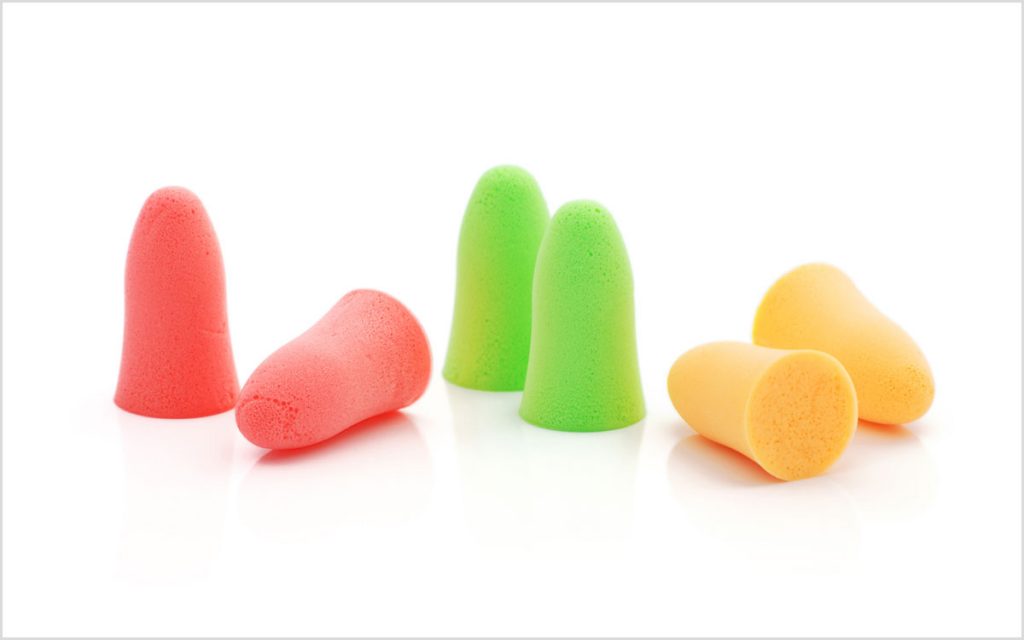If you’re exposed to loud noises–say using a lawnmower in your backyard, blasting your radio, or simply sleeping in your own bed next to a snoring spouse–earplugs can be helpful. In the first two cases, they can help protect your hearing by turning down the volume. In the last case, they lower the decibels plus help save your sanity (and maybe your marriage) by letting you get a good night’s sleep. But are these ear protectors actually harming your hearing?
Why use earplugs in the first place?
The case for earplugs is pretty simple: Properly used, earplugs can help protect your hearing by minimizing your exposure to excessive decibel levels. After you leave a loud place–say you walk past a construction site–you’ve probably noticed that your hearing seems different, and you may experience symptoms of tinnitus. This happens because those super-loud noises actually bend the tiny hair cells inside your inner ear. It often goes away within a day or two, because the hair cells have recovered.
But if you’re exposed to excessive decibels constantly–say you work on a construction crew or at an airfield–the aural assault on those tiny hair cells is relentless. Instead of bending and then recovering, the cells are damaged permanently. You’ve got about 16,000 of those tiny cells inside each cochlea, but up to 50% of them can be damaged or destroyed before your hearing has changed enough for the deficiency to show up in a hearing test.
How could earplugs cause damage?
With all that, you’d think that wearing earplugs would be a no-brainer when it comes to protecting your hearing. But particularly if you’re in situations where you’re exposed to loud noises all the time (like on the job or with the aforementioned snoring significant other), over-the-head earmuffs or noise-reducing (but not completely blocking) headphones are a better option. Earplugs are better-suited to one-off situations like a concert or game than for regular use.
Why? For one, wax. Your ears produce wax to protect themselves, and if you’re constantly wearing earplugs, they’re going to produce more of it–and you’re likely to push it in with the plugs. This can lead to problems like impacted earwax, which can cause tinnitus and other hearing problems.
Ear infections can be another problem for people who use earplugs. If you repeatedly wear the same pair–and you don’t clean them between uses–they can become breeding grounds for bacteria. Ear infections are, at a minimum, a painful annoyance. But at the worst-case-scenario end of the spectrum, they can also cause hearing loss if left untreated.
How can you use earplugs safely?
Earplugs still have a strong upside, whether it’s protecting your hearing or getting a good night’s sleep. You just need to be sure you’re using the right kind and using them the right way. Foam earplugs are the least expensive, which is good because you really shouldn’t reuse them–the soft, porous material is a germ’s paradise. Wax or silicone earplugs are reusable, but you need to keep them clean–use warm water and mild soap to wash them, and don’t put them back in your ears until they’re completely dry. (It’s also a good idea to store earplugs in a ventilated container to discourage moisture–or worse, bacteria or mold–from building up.)
If you want or need to wear earplugs regularly, you might want to talk to a hearing specialist about having custom-made earplugs. These are a little more expensive since they’re made from unique molds of your ears, but they’re reusable and–since they’re fitted to your ears–comfortable. Again though, to prevent any potential hearing damage, it’s important to practice good earplug hygiene!


